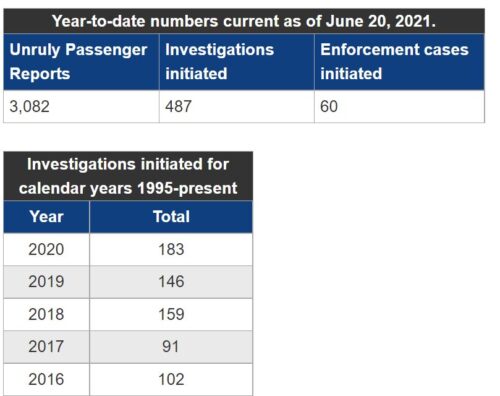As airline passenger volume ticks up, many passengers are packing something the Transportation Security Administration and airlines would rather they’d leave home: a combative attitude.
“Passengers do not arrive at an airport or board a plane with the intent of becoming unruly or violent; however, what is an exciting return to travel for some may be a more difficult experience for others, which can lead to unexpected, and unacceptable, behaviors,” said Darby LaJoye, TSA Senior Official Performing the Duties of the Administrator.
The Federal Aviation Administration (FAA) is reporting an alarming spike in incidents of unruly passengers.
Here is part of a table from the FAA showing all the cases investigated that cited violations of one or more FAA regulations or federal laws.
There are 3,082 incidents so far in 2021, compared to fewer than 200 cases in any of the past five years.

You’ve no doubt seen and read about all the crazy incidents on planes with passengers refusing to comply with federal regulations to wear face masks. But not as well-publicized are the incidents that have been taking place in airports.
TSA shared this in a statement:
“Two separate incidents this month have triggered referrals to law enforcement for passengers in Louisville, KY and Denver, CO. In Louisville, a passenger allegedly assaulted two TSOs while attempting to breach the exit lane and is facing state criminal charges for criminal trespass, fleeing and evading police, misdemeanor assault, and resisting arrest. The Denver incident involved a passenger allegedly biting two TSOs and remains under investigation. Both passengers also face a potential civil penalty of up to $13,910 for each violation of TSA security requirements.”
Here’s something that may help:
In early July the TSA is restarting its Crew Member Self-Defense (CMSD) training. Under the voluntary program, which was paused due to COVID-19 restrictions, Federal Air Marshals train flight crew members in defensive measure techniques for responding against an attacker in a commercial passenger or cargo aircraft.
During the training, flight crew members learn to identify and deter potential threats, and if needed, apply the self-defense techniques against attackers. The four-hour training is offered to flight crew members free of charge and is held at 24 locations around the United States.
“Through this training program, TSA’s Federal Air Marshals are able to impart their specialized expertise in defending against and de-escalating an attack while in an aircraft environment,” said LaJoye, “
Sara Nelson, the president of the Association of Flight Attendants-CWA, would like the course to be compulsory.
Assaulting or threatening a member of the flight crew is a federal crime and perpetrators may face civil penalties, criminal fines, or imprisonment. In May 2021 alone, the FAA proposed civil penalties ranging from $9,000 to $15,000 against five airline passengers for allegedly interfering with and, in two cases, assaulting flight attendants who instructed them to obey cabin crew instructions and various federal regulations.

